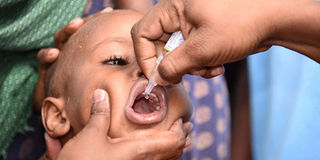Horn of Africa countries in joint polio drive

A child is being immunised against polio at Hagadera Refugee Camp in Dadaab on September 15, 2018. PHOTO | JARED NYATAYA | NATION MEDIA GROUP
What you need to know:
- Somalia is the epicentre of the outbreak, which now has been declared a public health emergency on a Grade 2 scale by the World Health Organisation.
- The region has responded with joint cross-border immunisation campaigns and related activities, including strengthened border vigilance, awareness creation, and routine immunization.
Efforts to eradicate polio in the Horn of Africa have received a boost following a meeting on Sunday between four countries from the region in Garissa.
Health ministers and representatives from Somalia, Ethiopia, Kenya, and South Sudan on Sunday signed a joint statement under auspices of the Intergovernmental Authority on Development (IGAD), further reinforcing their member countries’ support and future actions towards this goal.
The event marked a high-level response to the recent outbreak of vaccine-derived polio virus, in which Somalia has detected and reported seven cases from human contacts since December 2017.
Kenya also confirmed one case in an environmental sample gathered from the sewers of Nairobi’s Eastleigh in March 2018, which resulted in a countrywide polio immunisation campaign that is ongoing.
POLIO OUTBREAK
Somalia is the epicentre of the outbreak, which now has been declared a public health emergency on a Grade 2 scale by the World Health Organisation (WHO).
Other IGAD countries, namely Ethiopia, South Sudan, Sudan, Uganda, and Djibouti, are also at risk of polio outbreaks due to the frequent movement of large groups of people in the region and the porous borders across the countries.
Speaking during the event, the Ministry of Health Chief Administrative Secretary (CAS), Dr Rashid Aman, reiterated that diseases know no borders and countries in the region faced common challenges, including poor infrastructure, human conflict, porous borders and insecurity.
IMMIGRATION
Kenya’s Health Cabinet Secretary, Ms Sicily Kariuki, said that countries in the Horn of Africa had experienced repeated polio outbreaks, mainly due to immigration fuelled by low nutritional levels, population immunity and displacement.
Her Somali counterpart, Ms Fauziya Abikar Nur, outlined her country’s challenges, including the difficulty in reaching children in mobile populations, consisting of nomadic pastoralists and Internally Displaced Persons (IDPs), as well as access to compromised settlements in the South and Central areas, for both immunization and surveillance activities.
IMMUNISATION CAMPAIGNS
The minister emphasised the importance of ensuring that every child was reached, saying that the health sector could not afford to leave anyone behind in the campaign to eradicate the incapacitating disease.
Over the years, the region has responded with joint cross-border immunization campaigns and related activities, including strengthened border vigilance, awareness creation, and routine immunization.
The latest effort is expected to enhance coordination of campaigns. In the plans are polio campaigns in September in Kenya, targeting 2.8 million children under five and Ethiopia targeting 500,000. Somalia has scheduled a campaign for early October targeting 2.5 million children.





